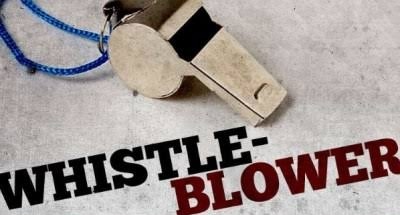A survey on five years of whistleblowing policy in Nigeria has revealed that the fear of victimisation has made the impact of the policy minimal.
The report released by the African Centre for Media and Information Literacy (AFRICMIL) with support from MacArthur Foundation on Wednesday in Abuja was to assess the impact of the whistle-blower policy introduced in 2016 as a tool to fight corruption in Nigeria .
Acting Executive Director, Dataphyte ,Adenike Aloba ,the survey reviewer said that the survey assessed the level of citizen awareness of the policy and their willingness to expose corrupt practices and to also know the perceptions of government Ministries Departments and Agencies (MDAs).
According to Aloba ,the findings reveals that 98.2 per cent of Nigerians perceived corruption as a serious problem and evidence showed that respondents expressed dissatisfaction with the information available to them on whistleblowing policy.
“Findings revealed that legislative protection and monetary reward for whistle-blowers were considered as key motivators for potential whistle-blowers.
“Overall evidences from both quantitative and qualitative data showed that while the whistleblowing policy recorded some achievements, its impact in curbing corruption remained minimal.
“This is due to several barriers including but not limited to lack of legislation protection ,limited funding ,insufficient data ,lack of political will, limited knowledge , poor reporting, controversial compensating mechanisms ,wide spread retaliation among others,” she said.
Aloba said that the survey therefore recommended that the Federal Government should provide appropriate mechanism to institutionalise the policy in MDAs to enhance implementation.
She said it also recommended that the Ministries of Finance and Budget and National Planning should collate and statistics of whistleblowing cases investigated and evidence of recovered fund and compensation.
She said that the move would encourage the culture of accountability and transparency for potential whistle-blowers.
She added that the executive should collaborate with the National Assembly to ensure that the whistle-blower bill was passed.
She called on state governments to embrace the policy and adopt a multi-sectorial approach to institutional it and the National Assembly should review and pass the policy before the end of their tenure.
She urged the Minister of Finance to ensure that the circular issued to all anti-corruption agencies became a policy document to maintain the culture of accountability and transparency for compensation of whistle-blowers.
Aloba urged the media to track and report prosecution of whistleblowing cases recoveries, compensations as well as whistle-blowers who suffer retaliation.
AFRICMIL’s Coordinator, Chido Onumah, said that AFRICMIL, with MacArthur Foundation, had been working on a project tagged Corruption Anonymous (CORA) designed to mobilise citizens to key into the whistleblowing policy.
Onumah said that to assess its performance over this period, AFRICMIL commissioned a survey in July targeting 7000 respondents and including key informants in MDAs and unions.
He added that the objective of this survey was to catalogue the data of the impact of the whistleblowing policy in addressing corrupt practices and other wrongdoing in Nigeria.
“We feel it is important for us to know why people are willing or not willing to blow the whistle and how well the protection mechanism has worked.
“Of course, the protection of whistleblowers against retaliation is key to the effectiveness of any whistleblowing regime.
“AFRICMIL also wanted to learn from this project how whistleblowing will change the face of Nigeria’s fight against corruption. The goal is to strengthen whistleblowing to become an acceptable tool for exposing corruption and other forms of wrongdoing that endanger society,’’ he said.
Onumah said that apart from the survey, AFRICMIL was also using the occasion to introduce a safe and secure whistleblowing platform which was put together in collaboration with the Yar’Adua Foundation.
He said that when launched, the platform would offer citizens an avenue to report corrupt practices anonymously thereby enlisting citizens to support the fight against corruption by providing tips or information to anti-corruption agencies.
Prof. Sadiq Radda ,Executive Secretary, Presidential Advisory Committee Against Corruption (PACAC) said that the committee had realised some challenges since the inception of the whistleblowing policy which included fear of lack of protection by prospective whistleblowers.
Radda said that another issue was that of the monetary compensation which made people to have ulterior motive towards the practice of whistle blowing because of selfish interest and jeopardising the relations and the guidelines of the policy.
He said that another challenge was that some civil servants were a hindrance to the whistle blowing policy because they made the policy as a business by contracting people to blow the whistle for selfish reasons.
He encouraged citizens not to give up on the whistleblowing policy in the absence of a law that protected them adding that the existing laws under anti-corruption agencies could protect them pending when the National Assembly would pass the whistleblower bill.
Radda said that another area of corruption in Nigeria was in humanitarian services as people subvert aids that came from outside and within the country for Internally Displaced Persons.
He added that there was also need to beam the searchlight on public office holders in terms of assets declaration as most of them acquire assets beyond their earnings barely six months into office, adding that PACAC would work with AFRICMIL in that regard.
Mr Dayo Olaide, MacArthur’s representative said that the rationale for the Foundation’s support for the whistle blower policy was for it to serve as an opportunity to mobilise the voice of Nigerians to be a part of the campaign against corruption.
“In addition to that beyond mobilisig citizens, we want to see the extent to which the whistle blower policy can serve as a tool to strengthen voices of citizens not just outside but also within government,” he said.
He lamented that the lack of protection for whistle blowers especially when corruption fight back was a challenge that needed to be tackled while calling on government to always assess the impact of policies made to know the level of achievements.








